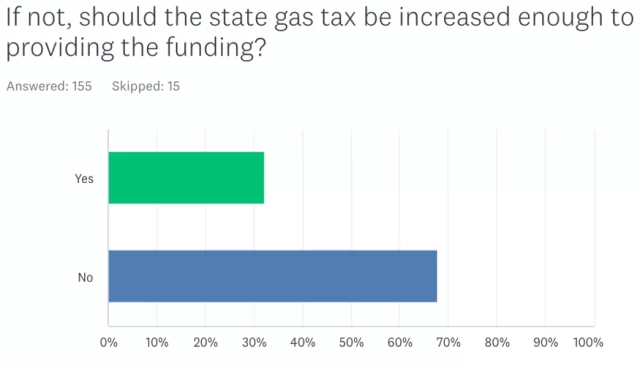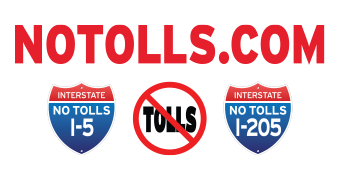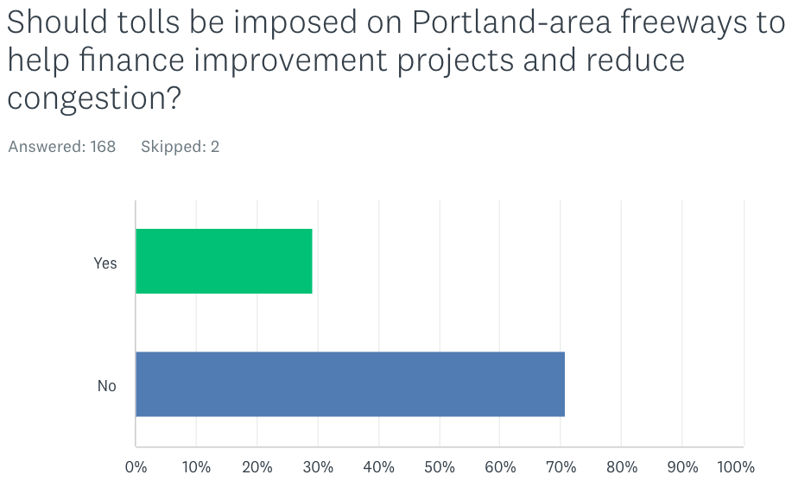Revenues not keeping pace with inflation due to increases in vehicle fuel efficiency
By Jim Redden Portland Tribune
The vast majority of Pamplin Media Group readers are opposed to tolling freeways in the greater Portland region to finance improvement projects and reduce congestion, according to a recent unscientific online survey.
The Oregon Legislature has directed the Oregon Department of Transportation to impose tolls on Portland area freeways, in part to make up for state gas tax revenues that are not keeping pace with inflation because of increases in vehicle fuel efficiency.
But the survey found that 71% of respondents oppose such tolls.
“Everyone is having to tighten their belts with the current economy. So should ODOT,” said one respondent who represented the majority.
Only 29% support tolls.
“Tolls are reasonable so those who use the improvements pay for them,” said a respondent in the minority.
Asked if the gas tax should be increased instead, the majority — 68% — said no.
“The current state gas tax should be sufficient to fund these projects as gas prices have been high for several years. I seriously question how the budget is managed,” said an opponent.
Only 32% back such an increase.
“The gas tax is way too low. Just raise it!” said a supporter.
The survey was conducted while a legislative panel was conducting public hearings on tolling parts of I-5 to support improvements in the Rose Quarter and I-205 to support widening and bridge replacement projects.
The Special Subcommittee on Transportation Planning of the Joint Committee on Transportation held hearings on the I-5 Rose Quarter Tolling Project and the I-205 East Portland Area Tolling Project on Saturday, Dec. 2. It will hold a hearing on the Wilsonville, Charbonneau, Lake Oswego, and Tualatin Area Tolling Project from 5 p.m. to 7 p.m. at the Council Chambers in Wilsonville City Hall.
If the survey is accurate, subcommittee members should not expect to hear much support for new taxes, fees, or other revenue sources, however. Asked what sources should be created to help fund freeway projects, the largest single response was that state government already has enough money but is wasting it:
“Reduce administration and use the money. There are enough funding sources.”
“Cut other government programs and spending. They have enough money, but can’t seem to spend it correctly.”
“The state has plenty of funding but poor money management skills. They should work with the funding already allocated and leave us alone.”
“Better oversight of projects to reduce costs. There is entirely too much waste happening.”
“Existing! We spend less when we have less on our inflation decimated family fixed-income.”
“Stop spending money on making two-lane roads into one-lame roads, adding one-way turns and islands, adding padded bike lanes, adding tons of crosswalks, changing the speed limits, and other projects that make traffic worse. Use that money to improve highways instead.”
A smaller number of respondents supported taxing vehicle miles driven, electrified vehicles and bicycles:
“Vehicle Miles Travelled charge, especially for vehicles that pay little to no gas tax.”
“Electric car users need to pay fees like those that are generated by the gas tax!”
“Charge all the bicycles that have the right of way on Portland public roads. They congest the roads more than cars do and don’t pay a dime to use the roads.”
“Tax hybrids & e cars to reflect lost revenues.”
“Folks are going to have to get used to the idea of a gps (global positioning system) unit on their vehicles.”
Some readers proposed increasing vehicle registration fees — and enforcing the existing ones:
“Enforce the laws requiring vehicles be licensed for one thing. At least every third car rolling around Portland doesn’t have updated tags.”
A handful of respondents proposed a “Package Delivery Fee” or “Amazon Fee.”
More information on the Special Subcommittee on Transportation Planning can be found at olis.oregonlegislature.gov.

Jim Redden is a reporter based in Portland, Ore.


